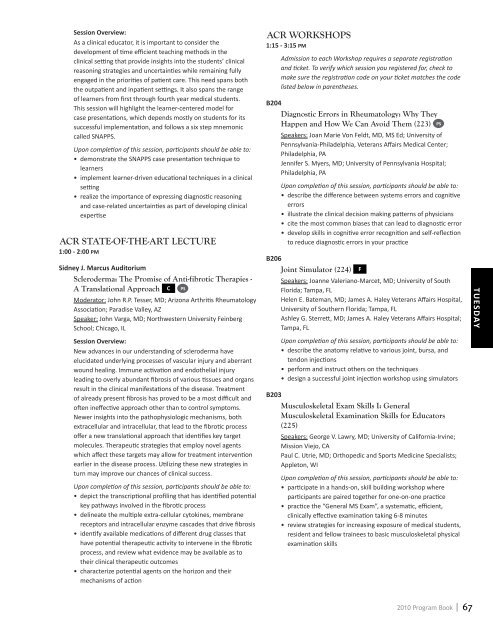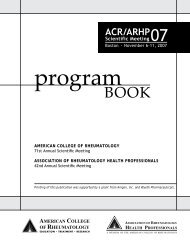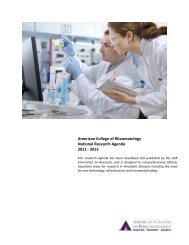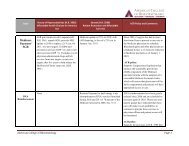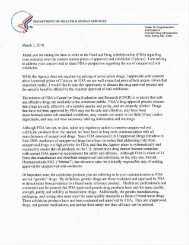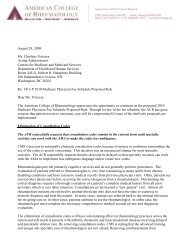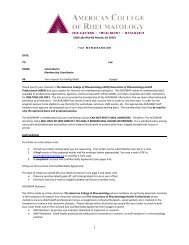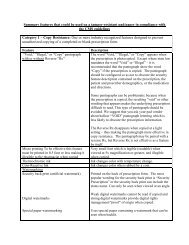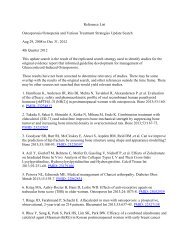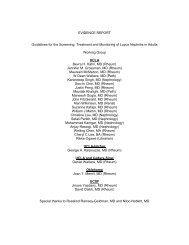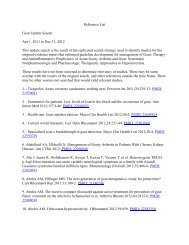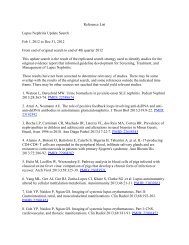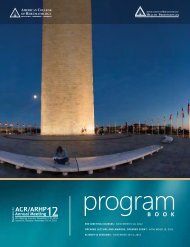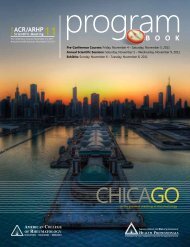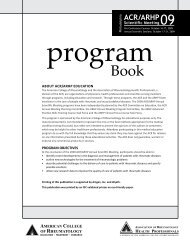B O O K - American College of Rheumatology
B O O K - American College of Rheumatology
B O O K - American College of Rheumatology
Create successful ePaper yourself
Turn your PDF publications into a flip-book with our unique Google optimized e-Paper software.
Session Overview:<br />
As a clinical educator, it is important to consider the<br />
development <strong>of</strong> time efficient teaching methods in the<br />
clinical setting that provide insights into the students’ clinical<br />
reasoning strategies and uncertainties while remaining fully<br />
engaged in the priorities <strong>of</strong> patient care. This need spans both<br />
the outpatient and inpatient settings. It also spans the range<br />
<strong>of</strong> learners from first through fourth year medical students.<br />
This session will highlight the learner-centered model for<br />
case presentations, which depends mostly on students for its<br />
successful implementation, and follows a six step mnemonic<br />
called SNAPPS.<br />
Upon completion <strong>of</strong> this session, participants should be able to:<br />
• demonstrate the SNAPPS case presentation technique to<br />
learners<br />
• implement learner-driven educational techniques in a clinical<br />
setting<br />
• realize the importance <strong>of</strong> expressing diagnostic reasoning<br />
and case-related uncertainties as part <strong>of</strong> developing clinical<br />
expertise<br />
ACR State-<strong>of</strong>-the-Art Lecture<br />
1:00 - 2:00 PM<br />
Sidney J. Marcus Auditorium<br />
Scleroderma: The Promise <strong>of</strong> Anti-fibrotic Therapies -<br />
A Translational Approach C PS<br />
Moderator: John R.P. Tesser, MD; Arizona Arthritis <strong>Rheumatology</strong><br />
Association; Paradise Valley, AZ<br />
Speaker: John Varga, MD; Northwestern University Feinberg<br />
School; Chicago, IL<br />
Session Overview:<br />
New advances in our understanding <strong>of</strong> scleroderma have<br />
elucidated underlying processes <strong>of</strong> vascular injury and aberrant<br />
wound healing. Immune activation and endothelial injury<br />
leading to overly abundant fibrosis <strong>of</strong> various tissues and organs<br />
result in the clinical manifestations <strong>of</strong> the disease. Treatment<br />
<strong>of</strong> already present fibrosis has proved to be a most difficult and<br />
<strong>of</strong>ten ineffective approach other than to control symptoms.<br />
Newer insights into the pathophysiologic mechanisms, both<br />
extracellular and intracellular, that lead to the fibrotic process<br />
<strong>of</strong>fer a new translational approach that identifies key target<br />
molecules. Therapeutic strategies that employ novel agents<br />
which affect these targets may allow for treatment intervention<br />
earlier in the disease process. Utilizing these new strategies in<br />
turn may improve our chances <strong>of</strong> clinical success.<br />
Upon completion <strong>of</strong> this session, participants should be able to:<br />
• depict the transcriptional pr<strong>of</strong>iling that has identified potential<br />
key pathways involved in the fibrotic process<br />
• delineate the multiple extra-cellular cytokines, membrane<br />
receptors and intracellular enzyme cascades that drive fibrosis<br />
• identify available medications <strong>of</strong> different drug classes that<br />
have potential therapeutic activity to intervene in the fibrotic<br />
process, and review what evidence may be available as to<br />
their clinical therapeutic outcomes<br />
• characterize potential agents on the horizon and their<br />
mechanisms <strong>of</strong> action<br />
ACR Workshops<br />
1:15 - 3:15 PM<br />
Admission to each Workshop requires a separate registration<br />
and ticket. To verify which session you registered for, check to<br />
make sure the registration code on your ticket matches the code<br />
listed below in parentheses.<br />
B204<br />
Diagnostic Errors in <strong>Rheumatology</strong>: Why They<br />
Happen and How We Can Avoid Them (223) PS<br />
Speakers: Joan Marie Von Feldt, MD, MS Ed; University <strong>of</strong><br />
Pennsylvania-Philadelphia, Veterans Affairs Medical Center;<br />
Philadelphia, PA<br />
Jennifer S. Myers, MD; University <strong>of</strong> Pennsylvania Hospital;<br />
Philadelphia, PA<br />
Upon completion <strong>of</strong> this session, participants should be able to:<br />
• describe the difference between systems errors and cognitive<br />
errors<br />
• illustrate the clinical decision making patterns <strong>of</strong> physicians<br />
• cite the most common biases that can lead to diagnostic error<br />
• develop skills in cognitive error recognition and self-reflection<br />
to reduce diagnostic errors in your practice<br />
B206<br />
Joint Simulator (224) f<br />
Speakers: Joanne Valeriano-Marcet, MD; University <strong>of</strong> South<br />
Florida; Tampa, FL<br />
Helen E. Bateman, MD; James A. Haley Veterans Affairs Hospital,<br />
University <strong>of</strong> Southern Florida; Tampa, FL<br />
Ashley G. Sterrett, MD; James A. Haley Veterans Affairs Hospital;<br />
Tampa, FL<br />
Upon completion <strong>of</strong> this session, participants should be able to:<br />
• describe the anatomy relative to various joint, bursa, and<br />
tendon injections<br />
• perform and instruct others on the techniques<br />
• design a successful joint injection workshop using simulators<br />
B203<br />
Musculoskeletal Exam Skills I: General<br />
Musculoskeletal Examination Skills for Educators<br />
(225)<br />
Speakers: George V. Lawry, MD; University <strong>of</strong> California-Irvine;<br />
Mission Viejo, CA<br />
Paul C. Utrie, MD; Orthopedic and Sports Medicine Specialists;<br />
Appleton, WI<br />
Upon completion <strong>of</strong> this session, participants should be able to:<br />
• participate in a hands-on, skill building workshop where<br />
participants are paired together for one-on-one practice<br />
• practice the “General MS Exam”, a systematic, efficient,<br />
clinically effective examination taking 6-8 minutes<br />
• review strategies for increasing exposure <strong>of</strong> medical students,<br />
resident and fellow trainees to basic musculoskeletal physical<br />
examination skills<br />
tuesday<br />
2010 Program Book 67


